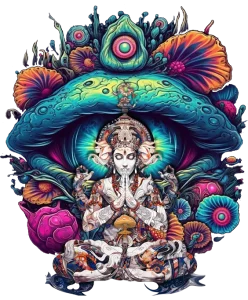Facing the end of life can bring a range of emotions, from fear and anxiety to sadness and existential distress. Many people who are nearing the end of their lives, whether due to terminal illness or advanced age, experience psychological suffering that is often hard to address with traditional treatments. In recent years, however, psychedelics like psilocybin and MDMA have shown promise in helping patients cope with the emotional and spiritual aspects of dying.
In this article, we’ll explore how psychedelics are being used in end-of-life care and palliative medicine to help patients find peace, relieve anxiety, and enhance their quality of life during their final days.
What Is End-of-Life Care?
End-of-life care focuses on providing comfort and support to people in the final stages of life. This care includes managing physical symptoms like pain, but it also addresses emotional, psychological, and spiritual needs. Palliative care is similar, but it is offered earlier in the disease process to improve the quality of life for people with serious, chronic, or life-threatening illnesses.
One of the biggest challenges in end-of-life care is dealing with existential distress—the deep anxiety and fear people feel when confronting their mortality. This distress often goes beyond the reach of conventional treatments like talk therapy or medication. That’s where psychedelics come in.
How Psychedelics Help in End-of-Life Care
Psychedelics like psilocybin (the active compound in magic mushrooms) and MDMA (commonly known as ecstasy) work by altering how the brain processes emotions, thoughts, and memories. In therapeutic settings, these substances are used to help patients confront difficult emotions and gain a sense of peace or acceptance about their situation.
Here’s how psychedelics help in end-of-life care:
1. Reducing Fear of Death
One of the main benefits of psychedelics in end-of-life care is their ability to reduce the fear of death. Many people report feeling a deep sense of oneness with the universe or a connection to something larger than themselves during a psychedelic experience. This can help ease the anxiety and fear that come with the thought of dying. Instead of focusing on the unknown, patients may come away with a sense of calm and acceptance about what lies ahead.
2. Providing Emotional Relief
End-of-life care is often filled with intense emotions, such as grief, sadness, and anger. Psychedelics help people process these emotions in a more meaningful way. During a psychedelic therapy session, patients are able to confront their feelings head-on and explore them in a safe and supportive environment. Many report feeling emotionally lighter after the experience, having worked through some of the pain or sadness they were holding onto.
3. Enhancing Spiritual Connection
For many people, the end of life brings up deep spiritual questions—about the meaning of life, the nature of the universe, and what happens after death. Psychedelics can help patients explore these questions and feel more connected to their spirituality. Many report having mystical experiences during psychedelic sessions that bring a sense of awe, wonder, and peace. These experiences can provide a sense of closure and help patients feel more prepared for the end of life.
4. Reducing Depression and Anxiety
People facing terminal illness or nearing the end of life often experience depression and anxiety, especially as they grapple with loss and uncertainty. Psychedelics like psilocybin have been shown in studies to significantly reduce depression and anxiety in patients with life-threatening illnesses. The effects can last for weeks or even months after a single session, giving patients a much-needed sense of relief during their final days.
The Science Behind Psychedelics in End-of-Life Care
Research on psychedelics in end-of-life care has been growing, and the results are promising. Studies have found that psychedelics can provide lasting relief from existential distress, anxiety, and depression in terminally ill patients. Here are a few key studies:
- Psilocybin for Anxiety and Depression: A 2016 study at Johns Hopkins University and NYU Langone Medical Center found that a single dose of psilocybin significantly reduced anxiety and depression in patients with life-threatening cancer. The improvements lasted for up to six months after the session, and many patients reported feeling more at peace with their diagnosis and less fearful of death.
- Mystical Experiences and End-of-Life Care: Research has also shown that patients who have mystical experiences during psychedelic sessions report greater improvements in their well-being and quality of life. These experiences often involve feelings of unity, transcendence, and connection to a higher power, which can help patients find meaning and peace as they approach the end of life.
- MDMA for Emotional Processing: MDMA has been used in palliative care to help patients process difficult emotions and trauma. Its effects of increasing feelings of empathy, connection, and emotional openness make it particularly useful for patients who are struggling to come to terms with their mortality or the impact of their illness on loved ones.
How Psychedelic Therapy Works in End-of-Life Care
Psychedelic therapy for end-of-life care is carefully guided by trained therapists in a controlled, supportive setting. Here’s how a typical session might unfold:
1. Preparation
Before the session, the patient meets with their therapist to discuss their goals and concerns. This step helps the patient feel more comfortable and sets the intention for the therapy. The therapist also prepares the patient for the psychedelic experience by explaining what to expect and how to navigate any challenging emotions that may arise.
2. The Psychedelic Session
During the session, the patient takes a dose of psilocybin, MDMA, or another psychedelic in a quiet, peaceful setting. The therapist remains with the patient throughout the experience, offering guidance and support as the patient explores their emotions, memories, and thoughts. The session can last several hours, depending on the substance used and the patient’s needs.
3. Integration
After the psychedelic experience, the patient meets with the therapist again to process what they experienced. This phase, known as integration, helps the patient make sense of any insights, emotions, or spiritual experiences they had during the session. Integration is a critical part of psychedelic therapy, as it helps patients apply the lessons from their experience to their everyday life.
Benefits for Caregivers and Loved Ones
Psychedelics don’t just benefit patients—they can also help caregivers and family members who are struggling with the emotional toll of watching a loved one approach the end of life. In some cases, family members may participate in group therapy sessions that include psychedelics to help facilitate open communication, emotional healing, and a sense of closure.
Psychedelics can also help caregivers process their own grief and anxiety, giving them the emotional resilience they need to continue supporting their loved ones.
Challenges and Considerations
While psychedelics hold great promise for end-of-life care, there are some challenges and considerations to keep in mind:
- Access: Psychedelics are still illegal in many parts of the world, making it difficult for patients to access this type of care. However, recent changes in laws and attitudes toward psychedelics have opened up new opportunities for research and clinical use.
- Safety: Psychedelic therapy should always be conducted in a controlled, therapeutic setting with trained professionals. The emotional and psychological intensity of the experience can be overwhelming, and having proper support is crucial for ensuring a positive outcome.
- Not for Everyone: Psychedelics are not suitable for all patients, particularly those with certain mental health conditions, such as schizophrenia or psychosis. Each patient should be carefully screened to determine if psychedelic therapy is appropriate for their situation.
The Future of Psychedelics in End-of-Life Care
As research on psychedelics continues to grow, more healthcare providers may begin to incorporate these substances into end-of-life care and palliative medicine. With proper training and regulation, psychedelics could become a valuable tool for helping patients face death with greater peace, clarity, and emotional well-being.
The future of psychedelic therapy in palliative care could include more widespread access to guided sessions, integration into hospice care programs, and continued exploration of how these substances can help with the emotional and spiritual challenges of dying.
Conclusion: A New Path for End-of-Life Care
Psychedelics are showing great promise in helping people navigate the emotional and existential challenges of the end of life. By reducing fear, easing anxiety, and fostering a sense of connection, these substances offer patients a new way to find peace and meaning in their final days.
As research continues to expand, the role of psychedelics in end-of-life care may grow, offering patients and their families an important tool for emotional healing and spiritual comfort during one of life’s most difficult transitions.

